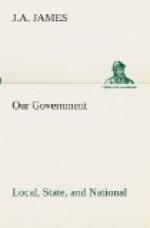9. What can you learn of reform movements that have taken place in your city’s history? Give the causes for the success or failure of these.
10. What is the cost of your city government per annum? Is it economically administered? What are the principal items of expense? Has the city other sources of revenue besides taxation?
11. What are the excellent features of your city’s government? What are its faults? How may the latter be corrected?
12. Mention some ways in which students can assist in bringing about better conditions in your city.
* * * * *
REFERENCES.
1. Reinsch, Young Citizen’s Reader, 80-83. Hoxie, How the People Rule, 63-83. Dole, Young Citizen, 93-108; 132-139.
PART II.
THE NATIONAL GOVERNMENT.
CHAPTER V.
EVENTS LEADING TO THE FORMATION OF THE UNION.
Colonial Relations.—Why was union so long delayed? How was it finally accomplished? These are always questions of great interest to the student of American government. We note the general indifference toward union among the colonies before the Revolutionary War. This may be partially accounted for by the fact that each colony had its own separate government, and was jealous of all outside interference. Lack of good roads and methods of travel made extensive communication between the scattered settlements difficult. Prejudice against strangers, and especially those of a different religious belief, was common. Bonds of sympathy, however, between the citizens of different colonies were not wholly lacking. Their language and customs were mainly English. Their chief desire was to develop a government according to their own plans. Common interests were at times created because of the necessity for providing protection against their Indian, French, and Dutch foes. In general, we may say, confederation was early brought about through need for defense, but union has been the result of two centuries and a half of growth.
Union of the New England Colonies, 1643.—A notable attempt was made to form a confederation among the colonies in 1643. It is known as the New England Confederation, and included Massachusetts Bay, New Plymouth, Connecticut, and New Haven colonies. Their united energies were necessary to furnish protection against dangers from the Indians. The Dutch and French also tended constantly to encroach upon their rights. The governing body of this confederation was a board of commissioners. In the annual meetings of the commissioners, two being sent from each colony, questions of war, relations with the Indians, and other matters of mutual interest were discussed. But this central government possessed advisory powers only. The colonies were to provide for their own local government. The confederation became constantly weaker, and was finally dissolved in 1684. Seventy years were to elapse before the call was sent out for a meeting of delegates from all the colonies at Albany, but the influence of the New England Confederacy was felt, no doubt, during that period.




